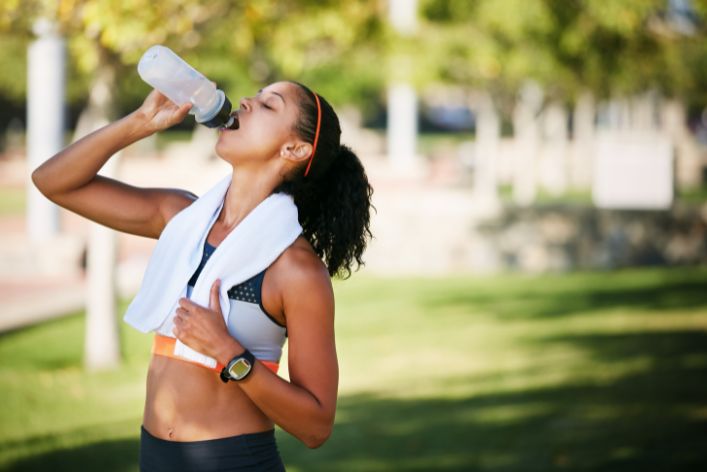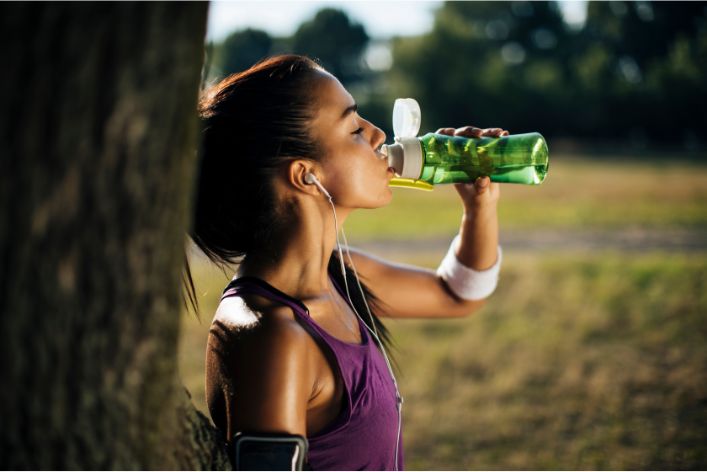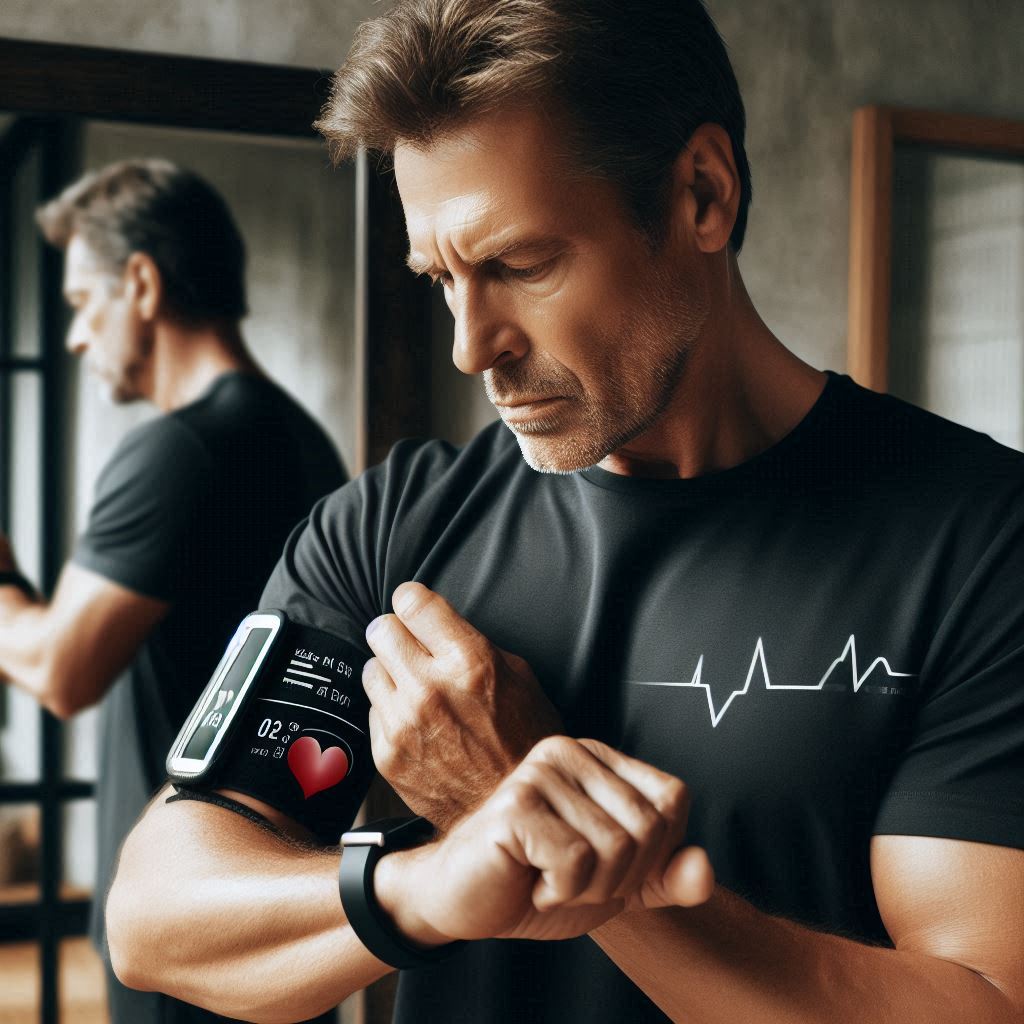As an athlete, staying hydrated is crucial to achieve peak performance. Dehydration can impair physical and mental abilities, making it essential to maintain proper fluid balance during exercise. Water is a vital nutrient for the body, and athletes should continuously drink fluids before, during, and after exercise to prevent dehydration.
Dehydration can lead to fatigue, muscle cramps, dizziness, and heat exhaustion. It also affects the body’s ability to regulate core temperature, making athletes more prone to heat stress and injury. Loss of fluids can also decrease blood volume, causing the heart to work harder to pump blood to the muscles.

To ensure that they stay hydrated, athletes should drink fluids even when not thirsty and avoid beverages with high amounts of sugar and caffeine. Sports drinks can be beneficial as they provide both fluids and electrolytes lost through sweat. Proper hydration can also aid in recovery, reducing the risk of injury and muscle damage.
Staying hydrated is essential for athletes to perform at their best. Dehydration can have severe consequences on athletic performance and health. It is crucial to maintain proper fluid balance and drink fluids regularly during exercise. By staying hydrated, athletes can prevent dehydration-related complications and optimize their performance.
Read: How to Create a Balanced and Nutritious Meal Plan
The Science Behind Hydration: Understanding the Importance of Proper Fluid Balance
Staying hydrated is essential for overall health, especially during exercise or physical activity. The human body is made up of approximately 60% water, and even small changes in fluid balance can affect physical performance and overall well-being. This article will explore the science behind hydration, explaining why and how the body loses fluid during exercise, the importance of electrolytes, and why proper hydration is crucial for optimal physical functioning.
The Science of Dehydration
- The human body loses water and electrolytes through sweat, breathing, and urine.
- Loss of even a small amount of fluid can lead to dehydration, which can cause fatigue, headaches, and dizziness.
- During exercise, sweat rates can be as high as 2 liters per hour, leading to rapid fluid loss.
- Dehydration can also lead to decreased blood volume, which can affect heart function and lead to further fatigue.
The Role of Electrolytes
- Electrolytes are minerals that help regulate fluid balance in the body.
- During exercise, electrolytes are lost through sweat and need to be replaced to maintain proper fluid balance.
- Common electrolytes include sodium, potassium, calcium, and magnesium.
- An imbalance of electrolytes can lead to muscle cramps, weakness, and other symptoms of dehydration.
The Importance of Proper Hydration
- Proper hydration is essential for optimal physical functioning and overall health.
- Drinking enough fluids helps regulate body temperature, lubricate joints, and transport nutrients throughout the body.
- During intense exercise or physical activity, it’s crucial to consume fluids at regular intervals to replace fluid lost through sweat.
- It’s important to drink fluids before becoming thirsty, as thirst is a sign that the body is already dehydrated.
Staying hydrated is essential for overall health and crucial for optimal physical functioning, especially during exercise or physical activity. Water and electrolytes are lost through sweat, urine, and breathing, and need to be replaced to maintain proper fluid balance.
Electrolytes play a critical role in regulating fluid balance, and an imbalance can lead to symptoms of dehydration. Proper hydration can help regulate body temperature, lubricate joints, and transport nutrients throughout the body, so it’s essential to drink fluids regularly and not wait until becoming thirsty.
Read: What is Creatine and Is it Healthy?
Pre-Workout Hydration
Hydration is essential for optimum athletic performance, and it starts long before you hit the gym. Proper hydration before exercise sets you up for success, providing your muscles and heart with the fluids and nutrients they need to perform at their best. In this post, we’ll outline guidelines for how much fluid to consume before exercise and why it’s essential to drink consistently throughout the day. We’ll also look at the best types of hydration for optimal energy and electrolyte balance.
Guidelines for Fluid Consumption Before Exercise
- Aim to drink at least 17-20 ounces of water 2-3 hours before your workout.
- Drink another 8 ounces 20-30 minutes before you start exercising.
- If you are prone to sweating heavily, drink an additional 8 ounces for every 10-20 minutes of exercise.
These guidelines apply to moderate to high-intensity workouts and are a starting point. You’ll need to adjust your fluid intake based on your individual needs and sweat rate. A good way to determine your sweat rate is to weigh yourself before and after a workout. For every pound lost, you should aim to drink 16-20 ounces of water to rehydrate.
Importance of Drinking Consistently Throughout the Day
Proper hydration isn’t just about what you drink before exercise. It’s also essential to drink consistently throughout the day. Your body is about 60% water, and it loses water through breathing, sweating, and digestion. When you don’t drink enough water, your body can become dehydrated, which can lead to fatigue, cramping, and decreased athletic performance.
Drink water or other hydrating beverages throughout the day, aiming for at least 8 cups (64 ounces). If you’re not sure if you’re drinking enough, look at the color of your urine. If it’s pale yellow or clear, you’re hydrated. Dark yellow or amber urine is a sign that you need to drink more water.
Best Types of Hydration for Optimal Energy and Electrolyte Balance
While water is essential for hydration, it’s not the only beverage that can help you perform at your best. Here are some of the best types of hydration for optimal energy and electrolyte balance:
- Sports drinks: These drinks contain electrolytes, carbohydrates, and fluids, making them an ideal choice for endurance activities lasting longer than 60-90 minutes.
- Coconut water: This hydrating beverage is high in potassium and magnesium, making it an effective way to replace electrolytes lost through sweat.
- Green tea: This beverage is high in antioxidants and can provide a natural energy boost without the added sugar found in sports drinks and energy drinks.
The bottom line is that proper hydration is essential for athletic performance. By drinking enough fluids before exercise, hydrating consistently throughout the day, and choosing the best types of hydration, you’ll be able to perform at your best and achieve your fitness goals.
Read: The Benefits Of Drinking Water
During-Workout Hydration
Staying hydrated during a workout is crucial to maintain optimal performance and prevent dehydration. Here are some guidelines for how much fluid to consume during exercise:
- Drink about 17-20 ounces of water 2-3 hours before exercise
- Drink 7-10 ounces every 10-20 minutes during exercise
- Drink 8 ounces of water within 30 minutes after exercising
But what if you’re engaging in endurance or high-intensity exercise for an extended period? In this case, it may be necessary to consume a sports drink that contains carbohydrates and electrolytes.
- The carbohydrates in sports drinks help provide energy during prolonged exercise
- Electrolytes such as sodium, potassium, and magnesium help replenish what you lose through sweating
- But be mindful of the sugar content in sports drinks and find a balance that works for your needs
In addition to proper fluid intake, electrolyte supplements may help prevent dehydration. These supplements come in pill or powder form and can be added to water or sports drinks.
- Be mindful of the ingredients in electrolyte supplements and avoid those containing excessive amounts of sugar or artificial additives
- Consult with a healthcare professional before taking any supplements
- For prolonged exercise lasting more than an hour, consider taking electrolyte supplements to maintain optimal hydration levels
While staying hydrated during exercise is essential, it’s also important to listen to your body’s thirst cues and adjust your fluid intake accordingly. Don’t be afraid to take a break and replenish fluids if needed to avoid the negative effects of dehydration.
Staying hydrated during a workout is crucial in maintaining optimal performance. From properly consuming fluids, and choosing the right sports drink for endurance and high-intensity exercises to taking electrolyte supplements, there are measures you can take to prevent dehydration. However, always listen to your body and consult a healthcare professional before taking any supplements.
Read: Is Intermittent Fasting Beneficial for You?

Post-Workout Hydration
Exercise can cause dehydration and loss of electrolytes, which can lead to decreased performance, muscle cramps, and fatigue. Therefore, it is important to hydrate and replenish your body after exercise.
How much fluid to consume after exercise?
- Consume 16-20 fluid ounces for every pound of body weight lost during exercise.
- Drink water and fluids with electrolytes, such as sports drinks.
- Monitor your urine color – it should be pale yellow.
Importance of replenishing lost electrolytes and fluids post-workout
- Electrolytes are minerals that help regulate fluid balance, muscle function, and nerve impulses.
- Loss of electrolytes can lead to muscle cramps, weakness, and fatigue.
- Fluids help transport nutrients to your muscles and carry away waste products.
Water vs. sports drinks: which is best for recovery?
- Water is usually enough for low-to-moderate intensity exercise lasting less than an hour.
- Sports drinks can be beneficial for intense exercise lasting longer than an hour, as they provide electrolytes and carbohydrates.
- Be mindful of the amount of sugar in sports drinks.
Proper hydration and replenishment of lost electrolytes are crucial for post-workout recovery. Make sure to consume enough fluids based on your body weight, and monitor your urine color. Water is sufficient for most exercise, but sports drinks can be beneficial for intense and prolonged exercise. Keep your body properly hydrated to perform your best and avoid unwanted side effects.
Read: How to Reduce Salt Intake in a High-Sodium Diet
Hydration and Athletic Performance
Hydration is crucial for athletic performance, and proper hydration techniques can help achieve optimal results. The following lists will explore the benefits of staying hydrated during exercise, the role of hydration in injury prevention and recovery, and the importance of water intake for temperature regulation.
Improved muscle function and endurance with proper hydration
- Water comprises 60% of the human body, which means dehydration can impact muscle function.
- Even slight dehydration can reduce endurance and impede the ability to perform complex movements.
- Proper hydration prevents muscle damage and fatigue, leading to increased physical performance.
- H2O is essential for the body to produce energy, as it fuels the cells with vital nutrients.
How hydration can help prevent injury and reduce recovery time
- Dehydration can lead to loss of coordination, focus, and cognitive function, which may result in injury.
- Proper hydration minimizes the risk of injury by maintaining fluid levels in the body and enhancing reaction time.
- Water also plays a vital role in the body’s natural healing process, reducing recovery time from injuries.
- Dehydration can impair the immune system, making athletes more susceptible to infections and illnesses, which in turn, may extend the recovery time of injuries.
Importance of hydration in temperature regulation during exercise
- Physical exertion in high temperatures can cause the body to lose large amounts of water, leading to dehydration.
- Water regulates the body temperature, and when it is under stress because of exercise, it requires more fluids to cool down.
- Drinking water helps the body maintain its core temperature, preventing overheating and heat-related illnesses, such as heat exhaustion or heat stroke.
- Proper hydration also helps the body sweat more efficiently, allowing athletes to exercise longer and harder without feeling overly fatigued.
Proper hydration is vital for optimal athletic performance. Athletes should ensure they drink water before, during, and after exercise. As a general rule, it is recommended that athletes drink at least 17-20 ounces of water two to three hours before exercise, drink 7-10 ounces of fluid every 10-20 minutes during exercise, and drink at least 16-20 ounces of fluid for every pound of bodyweight lost due to sweating after exercise. With proper hydration, athletes can improve muscle function and endurance, prevent injury, and better regulate body temperature during exercise.
Read: What Preventative Health Care Steps Should You Take?
Conclusion
In conclusion, hydration is a crucial aspect of physical performance, and athletes should make it a priority. Consistently drinking adequate amounts of water and electrolyte-filled fluids like sports drinks will benefit both an athlete’s physical and mental endurance.
To ensure optimal hydration, it’s vital that all athletes consult a healthcare professional. They can determine individualized hydration recommendations based on factors such as body weight, temperature, humidity, and duration and intensity of exercise.
Put Your Tech Company on the Map!
Get featured on Nicholas Idoko’s Blog for just $200. Showcase your business, boost credibility, and reach a growing audience eager for tech solutions.
Publish NowAthletes should also keep in mind hydration doesn’t stop when the workout is over. Continued hydration throughout the day aids in muscle recovery, reduce the risk of injury, and safeguards overall health.
So, athletes, don’t overlook the basics- staying hydrated. It’s crucial to achieving optimal performance, and you’ll be surprised at how well you perform with the right amounts of fluid intake. Remember, always prioritize hydration!
Read: How Can We Improve Air Quality for Better Health?
Before You Go…
Hey, thank you for reading this blog to the end. I hope it was helpful. Let me tell you a little bit about Nicholas Idoko Technologies. We help businesses and companies build an online presence by developing web, mobile, desktop, and blockchain applications.
We also help aspiring software developers and programmers learn the skills they need to have a successful career. Take your first step to becoming a programming boss by joining our Learn To Code academy today!
Be sure to contact us if you need more information or have any questions! We are readily available.











